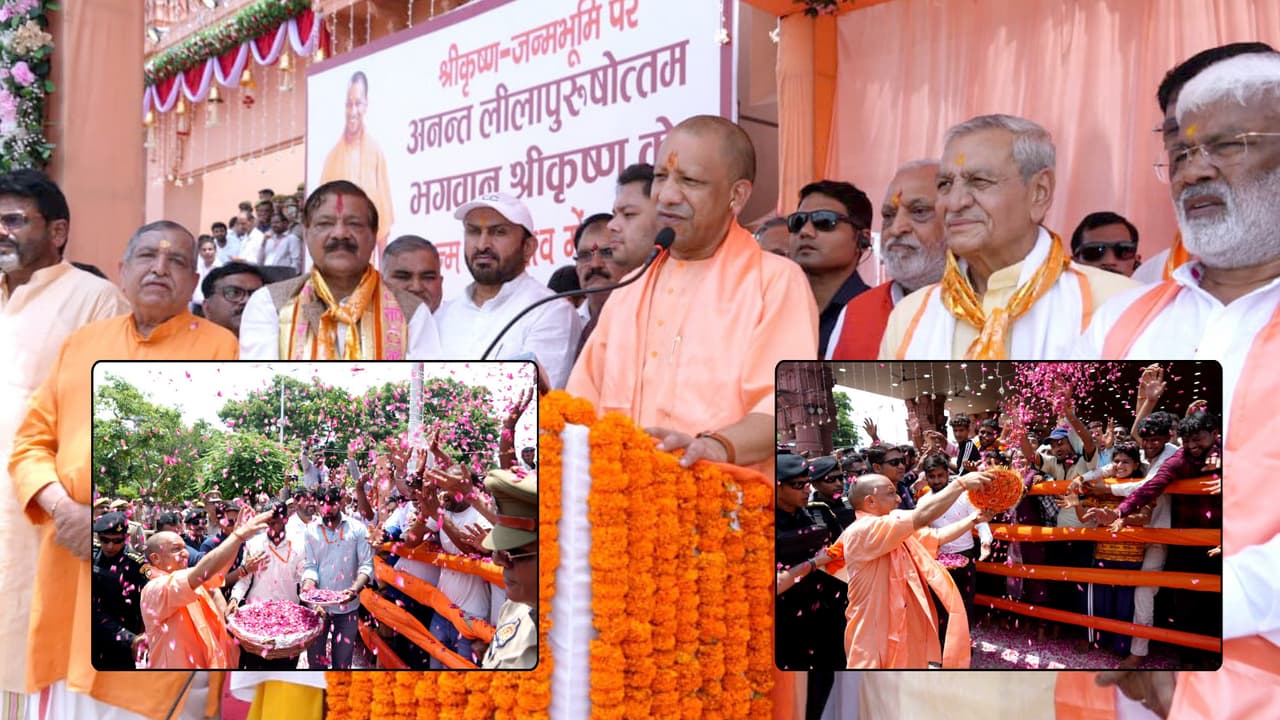On Janmashtami, CM Yogi said true devotion lies in public welfare. At Krishna Janmabhoomi, he greeted devotees, urged protection of Sanatan Dharma, and called on people to follow the path of Dharma for the nation’s welfare.
Mathura, August 16: On Shri Krishna Janmashtami, Chief Minister Yogi Adityanath visited Shri Krishna Janmabhoomi in Mathura, offered prayers, and urged devotees from India and abroad to follow Lord Krishna’s path of Dharma while working for society and the nation’s welfare. He also underlined the need to preserve Sanatan heritage alongside modern development and highlighted his government’s achievements.
Arriving at Shri Krishna Janmabhoomi around 11:50 a.m., Chief Minister Yogi Adityanath offered prayers to Thakur Keshavdev and Mata Yogmaya, followed by a pooja at the Shri Krishna Chabutra inside the sanctum sanctorum. After visiting Bhagwat Bhawan, he addressed the devotees, chanting ‘Vrindavan Bihari Lal ki Jai’ and ‘Jai Shri Radhe,’ as the premises reverberated with devotional echoes.
Extending greetings on the 5252nd birth anniversary of Shri Krishna, the Chief Minister said that Braj Bhoomi is the land of Lord Vishnu’s complete incarnation as Lord Krishna and his divine ‘Leelas’. He added that it is the good fortune of Uttar Pradesh that several incarnations of the Lord have sanctified this land. From Ayodhya to Mathura, he noted, these places stand as enduring symbols of India’s spiritual heritage.
The Chief Minister said that for the past eight years, he has had the privilege of participating in Janmashtami celebrations and Barsana’s Rangotsav. He added that his government is committed to restoring the glory of Mathura, Vrindavan, Barsana, Gokul, Baldev, Govardhan, and Radha Kund, and developing them as global pilgrimage destinations.
Reiterating the commitment of the ‘double-engine government’ under Prime Minister Modi’s leadership, the Chief Minister said efforts are being made to ensure modern development while preserving spiritual heritage and providing better facilities for devotees. Citing the Kashi Vishwanath Dham and the grand Ram Temple in Ayodhya, he noted that Uttar Pradesh is setting a new paradigm by blending timeless traditions with state-of-the-art development.
In his address, Chief Minister Yogi Adityanath stressed the importance of cow protection, describing ‘Gaumata’ as a symbol of Sanatan Dharma. He said his government is ensuring the care of destitute cattle and providing Rs 1,500 per month to farmers who rear cows, with over 1.6 million cows currently being protected. Urging people to guard against divisive tendencies of caste, region, or language, he called for honoring soldiers at the borders and fostering social unity. He added that as long as the flag of Sanatan Dharma guides the world, the values of universal brotherhood, peace, and harmony will endure.
The Chief Minister referred to Prime Minister Modi’s ‘Panch Pran,’ which include eradicating the remnants of slavery, adopting Swadeshi as a way of life, preserving heritage, honoring soldiers, and fostering social unity. Highlighting projects like the Kashi Vishwanath Dham and the grand Ram Temple in Ayodhya, he said they have revived India’s spiritual and cultural legacy. He also noted that the corridor at Vindhyavasini Dham is now attracting large numbers of devotees.
The Chief Minister praised the Braj Teerth Vikas Parishad for driving the development of the Braj region under the guidance of public representatives, saying it is “our duty to link this 5,000-year-old heritage with modern progress”. Addressing devotees, he also urged them to remain vigilant against negative forces that seek to weaken the country.
CM Yogi emphasized the need to respect the symbols of Sanatan Dharma, including rivers like the Ganga and Yamuna, Gaumata, Gayatri, and sacred pilgrimage sites, saying they are integral to the nation’s identity and their preservation is citizens’ shared responsibility. Concluding his address, he once again extended Janmashtami greetings and raised slogans of ‘Shri Keshav Dev Maharaj ki Jai,’ ‘Shri Krishna Kanhaiya ki Jai,’ ‘Shri Radha Rani ki Jai,’ ‘Shri Yamuna Maiya ki Jai,’ and ‘Bharat Mata ki Jai.’
